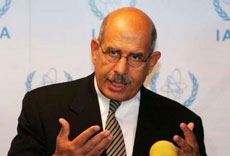|
Lebanese Vote in Hotly Contested Polls
 |
|
"Bear in mind that you cannot treat Iran like Iraq or Libya," Rafsanjani said. (Reuters)
|
TEHRAN,
August 12, 2005 (IslamOnline.net & News Agencies) – The nuclear
standoff between Iran and the West seemed escalating again Friday,
August 12, with the Islamic Republic's rejection of the UN nuclear
watchdog's decision calling on Tehran to suspend all
enrichment-related activities.
"Iran
will not bend. Iran will be a nuclear fuel producer and supplier
within a decade," Iranian negotiator Cyrus Nasseri said Thursday
after the International Atomic Energy Agency (IAEA) issued its
resolution, voicing "serious concern" at Tehran's decision
to resume uranium conversion activities, according to Agence
France-Presse (AFP).
Nasseri
added that "what is absurd is that a decision is passed here
which betrays" the IAEA's "ability to verify that a peaceful
facility remains peaceful."
Tehran
had voluntarily halted the work at Isfahan in November 2004 as a
goodwill gesture to kick-start nuclear negotiations with the EU.
Nasseri
said Iran had a right to carry out fuel cycle work for peaceful
purposes under the nuclear Non-Proliferation Treaty (NPT) and refused
to abandon such activities. Any future talks would have to be on this
basis, he said.
He
further told reporters that "operations in Isfahan will continue
under full-scope safeguards" and that Iran was fully within its
rights.
He
said Iran would maintain its suspension of enrichment activity at
another facility, in Natanz, "to keep the door open for
negotiations."
Iranian
foreign ministry spokesman Hamid Reza Asefi expressed a similar
message in Tehran, saying that the IAEA resolution was
"unacceptable" and a "political resolution adopted
under pressure from the United States and its allies."
The
resolution by the IAEA's 35-nation board of governors, urging Tehran
to halt resumption of uranium conversion activities, set a September 3
date for a report on Iran's compliance which could lead to a new
emergency IAEA meeting and possible referral to the Security Council
for sanctions.
But
Tehran remained defiant Friday, with a top regime figure saying Iran's
decision to resume uranium conversion is "irreversible".
"Bear
in mind that you cannot treat Iran like Iraq or Libya," Akbar
Hashemi Rafsanjani, the influential former president said in his
Friday sermon, AFP reported.
"You
could drag things on but Iran's decision is irreversible," he
said, drawing chants of "Death to America" and "Death
to Israel" from the worshippers.
"Do
not take lightly what happened at the IAEA," Rafsanjani warned.
"It
is very important and will create new conditions for our country and
the region. It will turn a new leaf in the history of our
revolution," said the prominent ayatollah who heads Iran's top
arbitration body, the Expediency Council.
Seen
as a savvy deal-maker, Rafsanjani was the top challenger in Iran's
recent presidential election.
Reactions
 |
|
ElBaradei said that he saw a "window of opportunity". (Reuters)
|
The
resolution came Thursday, on the third day of talks at the
Vienna-based IAEA and a day after Tehran had raised the stakes in the
dispute by removing IAEA seals at a conversion facility in Isfahan,
400 kilometers (250 miles) south of Tehran.
The
resolution said Tehran should stop the nuclear fuel cycle work that
has raised Western fears that it wants to develop nuclear weapons, a
charge it denies.
Iran
was urged "to reestablish full suspension of all
enrichment-related activities including the production of feed
material, including through tests or production at the uranium
conversion facility."
US
President George W. Bush welcomed the resolution as "a positive
first step" and said US strategy was to work with the Europeans
"so that the Iranians hear a common voice speaking to them about
their nuclear weapons ambitions."
UN
Secretary General Kofi Annan called on Iran to halt nuclear fuel work.
"The
(IAEA) has spoken with one voice and the secretary general expects its
resolution to be implemented."
Hope
IAEA
chief Mohamed ElBaradei said that he saw a "window of
opportunity" for talks since both sides remain willing to
negotiate.
French
representative Philippe Thiebaud told the board, however, that a total
suspension was necessary since the IAEA is still pressing Iran to
answer questions about almost two decades of hidden nuclear activities
up to 2002.
ElBaradei
said the "jury is still out" over whether there are
"undeclared nuclear materials or activities in Iran."
Thiebaud
said the Europeans "are willing to continue discussions (with
Iran) in the framework of the Paris agreement" but were also
ready to consider "any proposals or new ideas" from Iran.
ElBaradei
said the two sides were scheduled to meet in Paris at the end of
August and "I hope that meeting will go through."
Uranium
conversion produces a gas that is the feedstock for enriching uranium,
which fuels nuclear reactors or is potentially the raw material for
atom bombs.
Washington
charges that Iran, which hid its nuclear enrichment program for nearly
two decades, is secretly developing nuclear weapons.
Encouraged
by Iran, non-aligned nations at the IAEA had opposed the draft
resolution and forced a delay of more than an hour in Thursday's
formal board session as intense, closed-door negotiations continued.
In
its statement to the board, the Non-Aligned Movement stressed that
"all problems should be resolved through dialogue and peaceful
means, and in this regard calls on EU-3 and Iran to continue with
their dialogue with the view to achieving a mutually long-term
agreement in the mandate of the IAEA."
|